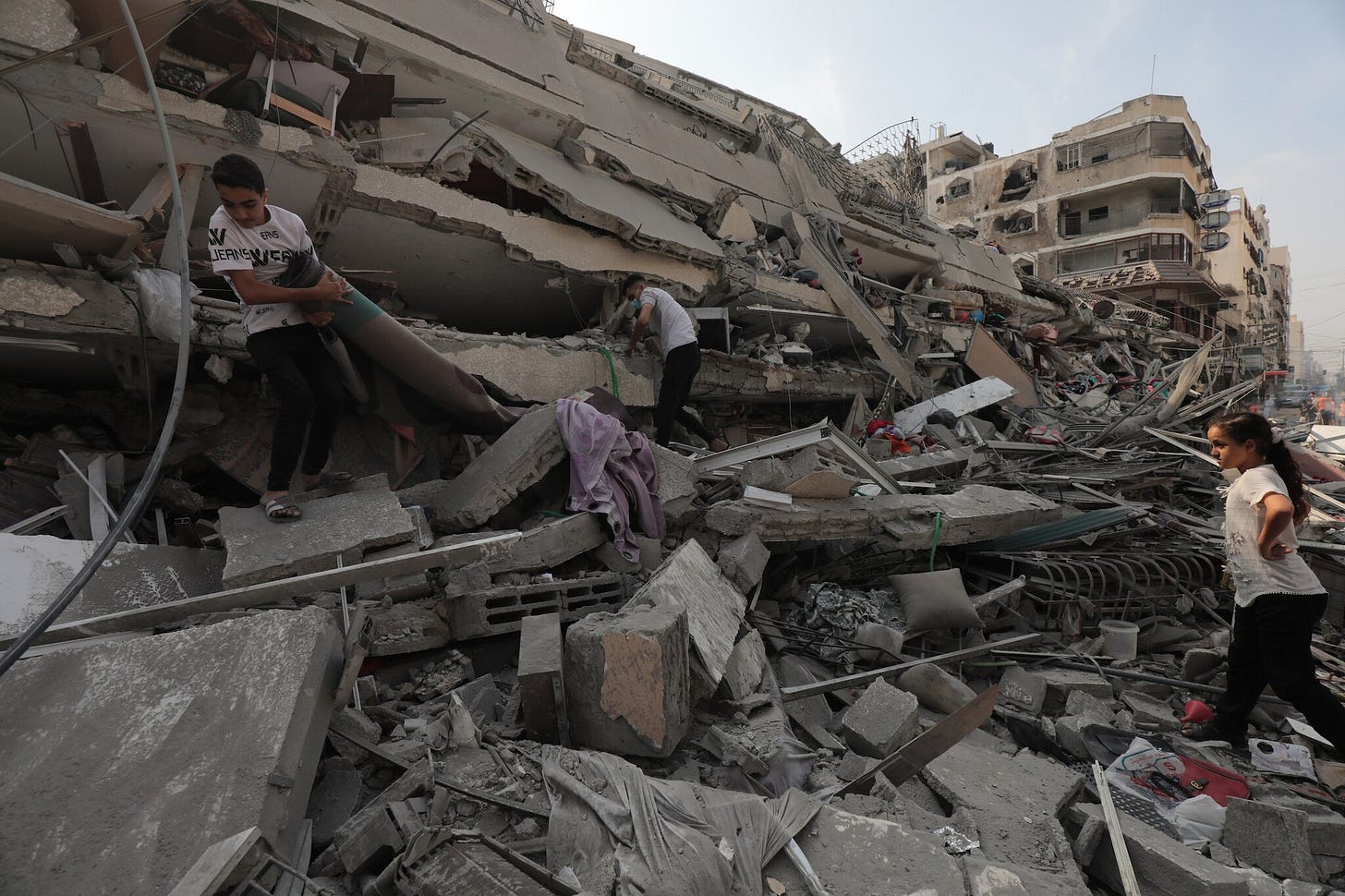Gaza’s Futile White Flags, Iran-Pakistan Tensions, Hamas in Lebanon, and More
This week at Inkstick Media.
Hello, everyone. We haven’t even made it out of January, but things are still heating up around the world: Israel’s war in Gaza has unintended consequences in Lebanon, the European far right is on the march, and tit-for-tat strikes between Pakistan and Iran have escalated regional tensions yet further.
Let’s start with the Gaza Strip, where Israeli forces stand accused of shooting and killing civilians carrying white flags while fleeing from battle zones. More than 100 such cases have been documented by human rights watchdogs, reports Mohammed Ali, who writes under a pseudonym.
Meanwhile, Israel’s war, which is nearing the four-month mark, has driven a surge in support for Hamas in neighboring Lebanon. Hamas fighters and local leaders say “thousands” of new recruits have signed up to fight Israel, as Hanna Davis writes in her dispatch from Saida.
Across the Mediterranean, the far right, spearheaded by hardline Hungarian Prime Minister Viktor Orbán, is targeting the European Union’s longstanding centrist consensus. Recent far-right successes around the bloc offer a worrying window into what might be to come, argues John Fetter.
That’s not all we’ve got at Inkstick. And if you’re not already, please follow us on Twitter, LinkedIn, Threads, Facebook, Instagram, and YouTube.
Here’s what’s new on Inkstick Media this week:
“The Stark Implications of the Israel-Gaza War for the United States” by Adults in a Room (Jan. 22)
Last November’s Reimagining US Grand Strategy roundtable brought members of the foreign policy community together to examine the role of the United States in the conflict and what direction it might go. There was widespread agreement that the Biden administration has tied itself to the approach of the Netanyahu government, allowing Israel broad authority to execute its war in Gaza and serving as a diplomatic shield to Israel at the international level.
“Iran-Pakistan Strikes Unveil Tensions on Normally Peaceful Border” by Asfandyar Mir (Jan. 22)
Relations between Iran and Pakistan have been generally peaceful and border skirmishes between the two sides have been minimal, or at least contained very close to the border and downplayed by both sides. This time, by announcing the attack, Iran broke from that trend.
“Israel’s Gaza War: When White Flags Cannot Save Palestinians” by Mohammed Ali (Jan. 23)
In November, an Israeli sniper gunned down 58-year-old Hala Abdel-Aty as she was holding a white flag. The Euro-Med Human Rights Monitor says there have been at least 100 instances of Israeli forces fatally shooting innocent civilians who were fleeing or posed no threat, oftentimes while raising up the universal symbol of surrender.
“Navigating New Horizons: Chinese-Russian Cooperation in the Arctic Gas Sector” by Yue Wang (Jan. 23)
In the grand chessboard of global energy politics, Russia has emerged as a pivotal player, backed by its vast hydrocarbon reserves, production, and exports. Despite the West imposing price caps on Russian oil, Russia’s oil sector has adapted rather quickly to the new reality. In need of new markets and amid a shifting geopolitical landscape, Russia has increasingly turned towards China.
“Israel's Gaza War Fuels Hamas's Popularity in Lebanon” by Hanna Davis (Jan. 24)
Despite Israel’s goal of eliminating Hamas, its war on the Gaza Strip has fueled support for the political party and armed group around the Middle East. A recent poll found that eight in ten Lebanese respondents viewed Hamas favorably. Meanwhile, the group says Israel’s war on the coastal enclave has driven “thousands” of new recruits to sign up for its armed wing in Lebanon.
“How the Far Right Is Taking Aim at the European Union’s Centrist Consensus” by John Feffer (Jan. 24)
In retrospect, the departure of the United Kingdom from the EU in 2020 may prove to have been just a minor speedbump compared to what Europe faces with the war in Ukraine, the recent success of far-right parties in Italy and the Netherlands, and the prospect that, after the next election, a significantly more conservative European Parliament could at the very least slow the roll-out of the European Green Deal.
“Pitting Existential Risks Against Near-Term AI Risks Is a False Dichotomy” by Heather Ashby (Jan. 25)
As a range of entities, from governments to civil society organizations seek to understand the implications of AI advances for the world, there is a growing debate about where governments and multilateral institutions should focus limited resources. Is it more pressing to focus on the macro existential or the more tangible near-term risks posed by AI? But this framing offers a false dichotomy.
“Deep Dive: A Missed Opportunity in the European Parliament” by Emily Tamkin (Jan. 25)
During the COVID-19 pandemic, the European Parliament had an “opportunity to shape Europe’s economic recovery and strengthen its institutional prerogatives through the establishment of the Recovery and Resilience Facility (RRF),” according to a new paper by Ermela Gianna. But the EP’s failure to assert itself as a budgetary authority left the body undermining its own bargaining positions.
“The Clean Energy Transition May Require Working with Industrial Titans” by Cleo Schroer (Jan. 26)
Perhaps paradoxically, there is an opportunity for fossil fuel incumbents to use their financial might and experience with capital-intensive projects to speed up a transition desperately needing a boost. To address the climate crisis we’ll need to work with these giants, even while holding them accountable.
From the desk of Patrick Strickland, the managing editor of Inkstick Media.





